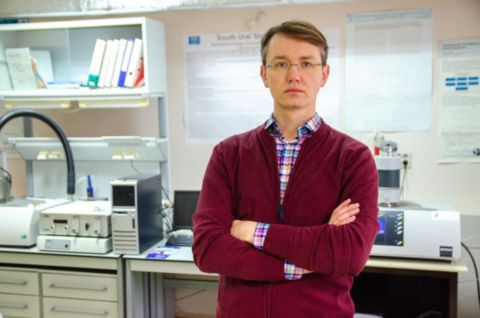International applicants wishing to study in Master's degree or postgraduate programmes will get a chance to obtain their education at South Ural State University (SUSU) free-of-charge. For that they must be among the winners of the Open Doors International Olympiad. SUSU, as one of the leading universities in Russia and winner of the Priority 2030 project, is the organizer of the Olympiad. Among the programmes, which the Olympiad winners can choose, are Chemistry and Materials Science.
Candidates and Doctors of Sciences of South Ural State University are ready to become academic advisors of international Master’s degree students and postgraduates in various scientific fields.
Candidate of Sciences (Chemistry) Oleg Bolshakov supervises the Chemical Sciences programme.
– Oleg, what are the advantages of studying at the Faculty of Chemistry?
– The Faculty of Chemistry and our group of materials science researchers are quite young. From the very beginning, the bar was set high with regard to the requirements to the scientific results and efficiency. What does it mean in practice? In the modern world, with its instability and junk information overload, scientists need timeless values, just like they did both one hundred years ago, and in the period of the scientific and technical revolution in the mid-20th century. Access to modern equipment, information resources, and enthusiastic young people. We have a stock of modern materials science equipment, covering the whole list of the currently available spectroscopy. Microscopy, from optical light microscopy to transmission and atomic force microscopy. Bench-top work is provided with all the necessary instrumentation. Access to all science literature databases is available. We have many students, and they are, without a doubt, the best ones in our region.
– Which main fields of activity could you name? What will international students be engaged in?
– Over the last 30 years, a clear trend has formed in materials science, which is replacing the classic inorganic semiconductors with synthetic ones. Since the discovery of polyacetylene – an organic conductor (the 2000 Nobel Prize in chemistry), scientists have been actively working on synthetic materials with good conducting and semiconducting properties. This was how the development of organic semiconductors began. But unlike inorganic semiconductors, their synthetic analogues can be modified using the methods of synthetic chemistry. This way, countless numbers of materials were obtained, which are used as light emitting diodes, the third generation of photosensitisers in photovoltaics, and field transistors.
– In which projects does the Faculty of Chemistry participate, and with which partners does it collaborate?
– Our university actively develops collaboration with industrial partners. Jointly with FGUP "NPO "Tekhnomash", we design a portable system for express analysis of water. The main requirements to the analysis systems are their sensitiveness and selectiveness. The technology being developed is based on using the fluorescent quantum dots, providing for low determination limits, and the highest selectiveness is achieved thanks to using antibodies. The simultaneous use of different fluorescent marks allows to identify several pollutants at once. The analysis block weighs no more than 2 kilograms and undergoes testing in Moscow at present. In addition, today we actively collaborate with Magnitogorsk Iron & Steel Works on creating a system of waste water treatment with the use of immobilized catalysts.
– Why is this field promising and in demand?
– By developing competences in the field of organic semiconductors we lay the foundation of power engineering and electronics, and photovoltaics of the future. We are sure that based on the materials that we design it becomes real to develop not only post-carbon power engineering, but also non-metallic electronics. Any scientific field is active interaction between several research entities. And our field is no exception. This can be easily seen in our publications. Each work is a joint effort of specialists from Chelyabinsk, Moscow, Ghent (Belgium), and Oviedo (Spain). It goes without saying that besides articles it means experience exchange, internships and conferences. And this is just the beginning. We are not fixed on our own work, we are always happy to get feedback from the outer world, and the Open Doors Olympiad is a wonderful opportunity for that. Our efforts are not left without reward. We know that we are not alone in our striving to grow. And that the world is full of ambitious and talented seekers. And we are looking forward when our possibilities join with their potential. All that is left is to knock on our door.
South Ural State University (SUSU) is a university of digital transformations, where innovative research is conducted in most of the priority fields of science and technology development. In accordance with the strategy of scientific and technological development of the Russian Federation, the university is focused on the development of big scientific interdisciplinary projects in the field of digital industry, materials science, and ecology. In the Year of Science and Technology, SUSU has become the winner in the in the competition under the Priority-2030 program. The university acts as a regional project office of the World-class Ural Interregional Research and Education Centre (UIREC).
About other programmes, which the Open Doors international Olympiad winners can choose, read on our website:
- Open Doors Winners Will Be Studying Wind-power Engineering with Guidance from a SUSU Professor
- Open Doors International Olympiad Can Help Become a Specialist in Power Engineering
- International Postgraduates Are Offered to Start Research in the Computer Science Programme
- Open Doors Olympiad Winners Can Become Specialists in Education




